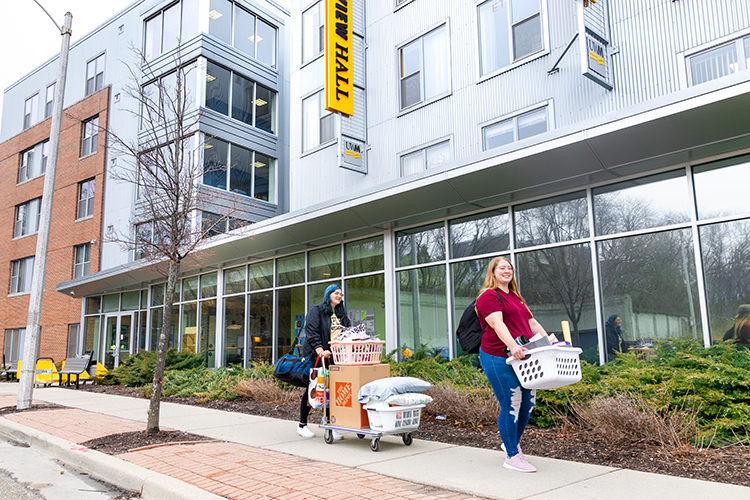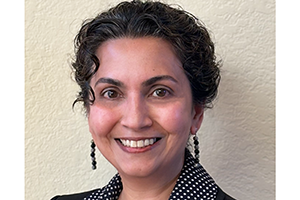In normal times, University Housing staff has two months or more to prepare for the controlled chaos of thousands of students moving home for the summer.
Suddenly in early March, the staff was faced with the need to plan to move students out in weeks rather than months because of the coronavirus crisis. At the same time, new decisions about the numbers and timing of moves led to the need for almost daily changes in those plans.
“We are working unbelievable hours,” said Beth Lobner, assistant director of University Housing.
Housing staff has been responding to ever-changing needs as the situation escalated from an extended spring break to moving all classes online.
“Literally every single day we were getting another email,” Lobner said. “We realized we needed to be thinking three or four steps ahead. It’s not like we’re moving out 20 students; we’re potentially getting 4,000 students to get out of the halls pretty quickly.” At the same time, the housing staff had to figure out how to accommodate residents who couldn’t leave.
A team effort
Doing that has taken a huge and continuing effort from everybody in Housing, from administrators to resident advisors, from student workers to web communicators and custodial staff. And, a lot of collaboration with other areas, said Arcetta Knautz, director of University Housing.
“At this point my team has done much of the heavy lifting, but UWM Environmental Services has been a tremendous help,” Knautz said. “The Dean of Students Office and Union Services will help later once we are at a later stage of move-out – packing up the ones who don’t return.”
The move-out is a multifaceted juggling act with many layers, Knautz said, since it’s not just a matter of students coming back to get their stuff.
“We have to maintain social distancing as people move out, and in high-rise buildings with elevators that’s a challenge. We have to store items for those who are away and can’t come back. We need to prepare the buildings for summer conferences if we get the halls back. We need to move in the students who are staying and also maintain social distancing for them.”
Accommodating those who stay
Many of the 179 residents staying are international students or graduate students working on research and projects that are continuing, said Matt Mountin, Housing’s outreach coordinator. He and his team manage communications, including websites, updates, FAQs and email responses to families. That has also included creating, updating and posting online forms so residents could apply to stay or set up move-out times to limit the number of people in the building at one time.
The work involves not just moving students out, but moving them around, Lobner said. Because local and state officials have requested the university make Cambridge Commons and RiverView available for potential hospital space, those two halls are being cleared out, cleaned and disinfected first. Residents who are staying will be consolidated into Sandburg East.
Custodians in the residence halls have been working hard along with everybody else. “The custodial staff has been wiping and mopping and disinfecting toilets and cleaning door handles,” said Lobner. “I don’t think our doorknobs have ever been cleaner.”
Since those buildings need to be emptied for potential conversion to medical use, housing staff also must figure out where to store items belonging to residents who can’t get back to move their belongings, Knautz said.
Students and parents who are returning to the residence halls to pack up have been calm and orderly, said Amber Detlefsen, a student staff member who works on the Sandburg Service Desk. She’s a senior biology major from Illinois, planning to graduate in May.
Parents and students are understandably concerned, she added, but students and families have been cooperative in limiting the number of helpers and only coming at assigned times to keep social distancing.
“They recognize we’re all going through a tremendous upheaval,” Detlefsen said. Most of the questions she gets at the front desk are about keys and mailboxes and similar routine details. “Sometimes they have questions we don’t have answers to,” but housing staff members are always available to handle those, she said.
Going above and beyond
Student workers were given the option of staying or continuing to work. Detlefsen chose to stay so she could afford to pay her own rent off-campus and to support the other students she supervises. The desk staff are taking more precautions than usual in wiping down counters and avoiding direct contact, so she is not too worried about her own safety, she said.
Staff members have been going above and beyond, working long hours and thinking creatively, Lobner said. For example, when the Restor in Sandburg closed and food items were no longer needed for planned student gatherings, Rachael Amick, academic and community engagement coordinator, invited students to “come down and eat all this food.”
A parent herself, Lobner has empathy for the concerns of families. She remembers answering an email from a mother who was practically hysterical because she couldn’t leave her own home to help her son get moved out. Lobner talked to her and helped arrange to get the student moved back to Ohio.
“For me, it was super simple and it took half an hour of my life, but for the parent, it was so important to her because she was worried about her son,” said Lobner, who shared the mother’s heartfelt thank-you note with housing staff.
Benefits in the long run
Everyone has been taking on new jobs and helping out where needed to get everything done, said Lobner. In the long run, the experience may have benefits.
“Because we’re in a time crunch, we really have to flex our brains differently, but we’re gaining new skills. No one ever thought we would need to do this, but we’re all going to be better professionals moving forward.”







